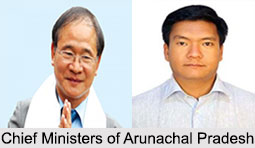 Chief Minister of Arunachal Pradesh is the chief executive of the North East Indian state of Arunachal Pradesh. As per the Constitution of India, the Governor of Arunachal Pradesh appoints the Chief Minister, whose council of ministers are collectively responsible to the assembly. After the Arunachal Pradesh Legislative Assembly elections, the Governor typically extends an invitation to the party or coalition holding the majority of seats to establish the government. With the assembly`s confidence, the Chief Minister serves a five-year term without any specific term limits.
Chief Minister of Arunachal Pradesh is the chief executive of the North East Indian state of Arunachal Pradesh. As per the Constitution of India, the Governor of Arunachal Pradesh appoints the Chief Minister, whose council of ministers are collectively responsible to the assembly. After the Arunachal Pradesh Legislative Assembly elections, the Governor typically extends an invitation to the party or coalition holding the majority of seats to establish the government. With the assembly`s confidence, the Chief Minister serves a five-year term without any specific term limits.
Prem Khandu Thungan
Prem Khandu Thungan was the first Chief Minister of Arunachal Pradesh from 13th August 1975 to 18th September 1979. He belonged to Janata Party.
Tomo Riba
Tomo Riba was the second Chief Minister of Arunachal Pradesh from 18th September 1979 to 3rd November 1979. He belonged to the People"s Party of Arunachal Pradesh.
Gegong Apang
Gegong Apang was the third Chief Minister of Arunachal Pradesh from 18th January 1980 to 19th January 1999. Earlier he belonged to the Indian National Congress party, but later he joined the Arunachal Congress.
Mukut Mithi
Mukut Mithi was the fourth Chief Minister of Arunachal Pradesh from 19th January 1999 to 3rd August 2003. He belonged to the Arunachal Congress (Mithi) and later joined the Indian National Congress.
Gegong Apang
Gegong Apang was again elected to serve as a Chief Minister of Arunachal Pradesh from 3rd August 2003 to 9th April 2007. During this tenure he represented the United Democratic Front but later joined the Bharatiya Janata Party. Thus, Arunachal Pradesh became the first state in North East India which was governed by BJP. However, toward the end of his tenure Gegong Apang rejoined the Indian National Congress.
Dorjee Khandu
Dorjee Khandu was the fifth Chief Minister of Arunachal Pradesh from 9th April 2007 to 30th April 2011. He belonged to the Indian National Congress.
Jarbom Gamlin
Jarbom Gamlin was the sixth Chief Minister of Arunachal Pradesh from 5th May 2011 to 1st November 2011. He belonged to the Indian National Congress.
Nabam Tuki
Nabam Tuki was the seventh Chief Minister of Arunachal Pradesh from 1st November 2011 to 26th January 2016. He belonged to the Indian National Congress. He was again elected as the Chief Minister of Arunachal Pradesh for the second time from 13th July 2016 to 17th July 2016.
Kalikho Pul
Kalikho Pul was the eighth Chief Minister of Arunachal Pradesh from 19th February 2016 to 12th July 2016. He belonged to the People"s Party of Arunachal Pradesh.
Pema Khandu
Pema Khandu is the ninth and the present Chief Minister of Arunachal Pradesh. He is serving the position of Chief Minister of Arunachal Pradesh from 17 July 2016 to present. He is the incumbent Chief Minister of Arunachal Pradesh. Pema Khandu initially represented the Indian National Congress but later joined the People"s Party of Arunachal Pradesh. He presently belongs to the Bharatiya Janata Party.
President"s rule in Arunachal Pradesh
President`s rule, a constitutional provision allowing the central government to assume control of a state`s administration, was enforced in Arunachal Pradesh twice. The first instance occurred from November 3, 1979, to January 18, 1980, when the central government took charge of the state`s affairs. Subsequently, on January 26, 2016, President`s rule was again imposed, lasting until February 19, 2016. During these periods, the elected government in Arunachal Pradesh was temporarily dissolved, and the state came under direct governance from the President of India. This intervention typically takes place when there is a breakdown in the constitutional machinery of a state, leading to the need for central intervention to restore order and governance. The imposition of President`s rule is a significant measure aimed at ensuring stability and constitutional compliance during challenging periods in a state`s political landscape.






